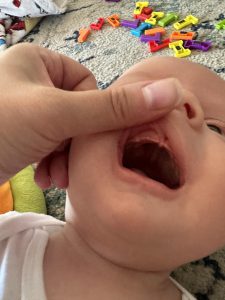Oral Ties in Babies and Children
Note: I am not a lactation or feeding professional. Please consult an International Board-Certified Lactation Consultant (IBCLC) or a Speech and Language Pathologist (SLP) that specializes in pediatric feeding therapy and is trained in orofacial myofunctional therapy (OMT) for help with feeding and to determine if there are any oral ties. I am here to help you understand how oral ties can affect your child and that not all oral ties create issues. It is all about being able to function properly to live the best life possible. Infant feeding choices (bottle vs. breastfeeding) can be a sensitive subject; that is not what this blog post is about, but rather how oral ties or restrictions can affect your child.

When your child was born, did the doctor, nurse, or midwife look in their mouth for oral ties (These are short, tight pieces of tissue under the lips, cheeks, and tongue)? More than 30 years ago, when I first became a mom, no one looked in my baby’s mouth, and I had no idea that my daughter had oral ties. Only more recently, when I became an orofacial myofunctional therapist, I realized that she has oral ties that may have impacted some of the issues she has dealt with over the years.
Today, more babies are being checked at birth. However, not all medical and dental professionals know how to assess or treat oral ties. Maybe they said there is a tie or restriction, but as long as your baby gains weight, it is nothing to worry about. Or your baby is not gaining weight, and you are nursing, and the doctor suggests supplementing with formula in a bottle. This conflicting advice can confuse new parents wanting to do what is best for their baby. They often do not know where to turn.
Oral ties can make it more difficult for a baby to get nutrition, affecting their ability to thrive. They may not gain weight or be very fussy during and after feedings. If the parent is breastfeeding, this may cause worries about low milk supply. In lip and tongue-tied babies, it often isn’t a low milk supply, but that baby has trouble latching and effectively removing the milk. Lip and tongue ties can sometimes make breastfeeding painful for the parent and exhausting for the baby. The baby may have blisters on their lips, milk might leak out, and the parent’s nipples may be flat or look like the end of lipstick.
When babies breastfeed, they use their tongue, jaw, and muscles to get milk from the breast. These muscles have to work hard to get the milk, but overall, this helps make a wider and fully grown jaw and face. Oral ties often lead to an underdeveloped jaw, tooth crowding, mouth breathing, snoring, sleep issues, and so much more. Preterm babies will have a tougher time nursing because they likely will not have the extra fat padding in their cheeks that helps with feeding. An IBCLC can help with that. Not everyone can breastfeed, and not everyone wants to, but understanding that when you can, it is not just about what breast milk can offer but also how it can help shape the development of the jaws and face more to their full ability.
 Babies with lip or tongue ties that take a bottle may also have feeding issues. They might have long feeds, difficulty holding the bottle nipple in their mouth, have trouble gaining weight and make clicking sounds lip-smacking during feedings.
Babies with lip or tongue ties that take a bottle may also have feeding issues. They might have long feeds, difficulty holding the bottle nipple in their mouth, have trouble gaining weight and make clicking sounds lip-smacking during feedings.
Babies with oral ties may also have a higher risk for acid reflux, gassiness, and gagging when eating. These babies will be more at risk for speech issues and mouth breathing and could have difficulty eating certain foods as they get older.
Signs and symptoms of oral ties can be signs of other health issues, so it is always good to see your pediatrician, IBCLC or SLP for an evaluation if you have any concerns.
Common Symptoms for Babies:
Infants are unable to tell you when something is wrong, which is why it is necessary for you to pay close attention to any of the following symptoms that can develop as a result of a lip or tongue tie:
- Baby falls asleep a lot during feeding. Also called a “lazy eater.”
- Baby has difficulty latching onto a bottle or breast
- Baby is very fussy during or after feeding
- Baby isn’t gaining weight as expected
- Baby makes clicking noises while breastfeeding
- Baby needs very long or frequent feedings
- Baby suffers from colic, GERD, and gas
- Breastfeeding parents may have nipple pain and soreness or find their nipples are flat or misshapen after feeding
- Concerns about low milk supply
 Common Symptoms for Children
Common Symptoms for Children
Even past babyhood, your child could be affected by lip and tongue ties. Many of the signs can be easily mistaken for other common problems, so it’s always important to have them checked out if you have concerns.
- Child wets the bed
- Child has trouble chewing solid foods
- Child has frequent cavities and crowded or crooked teeth
- Child grinds or clenches teeth
- Child can’t eat without vomiting, gagging, or choking
- Child breaths through their mouth
- Child has a speech delay or impediment
For more information about oral ties, visit: